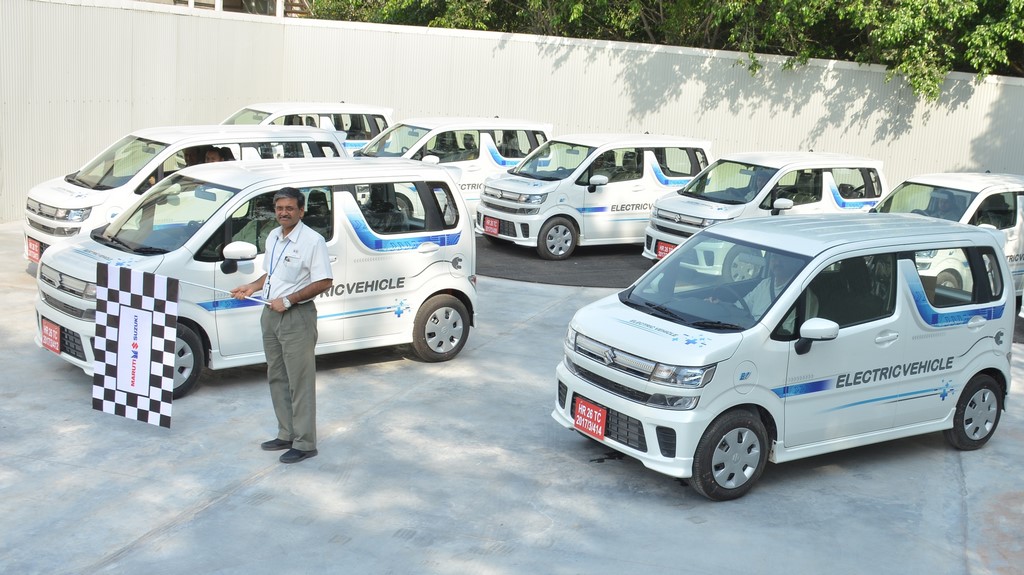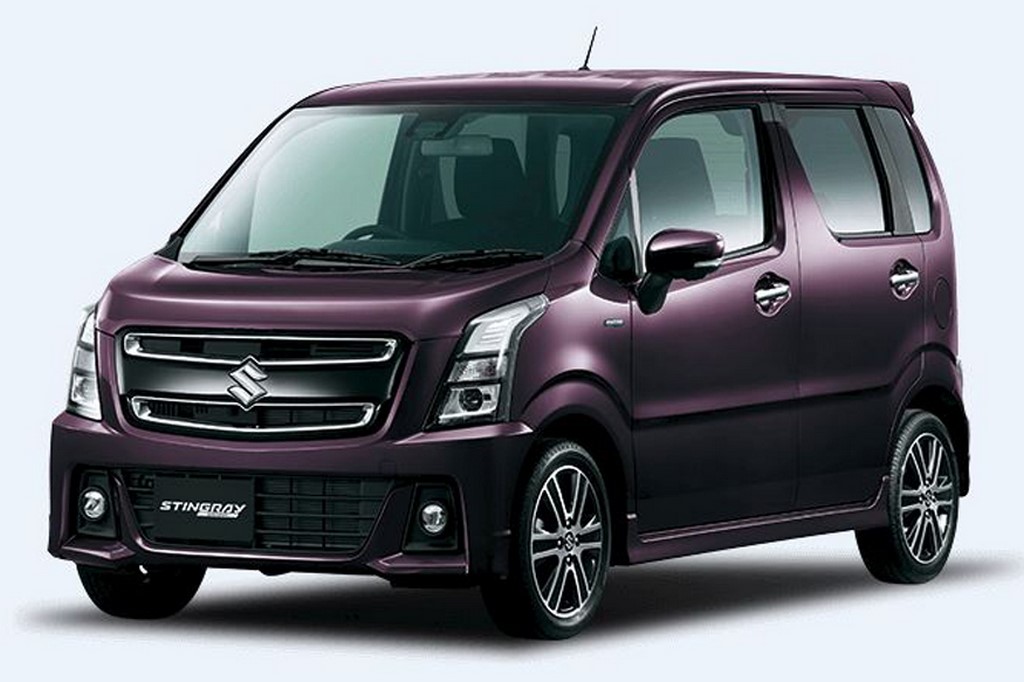Electric vehicles are finally getting the attention that they require for a greener future.

Upcoming Electric Cars
The Indian government has reduced the customs duty on import of components for electric vehicles. Hence, most of the carmakers including big luxury brands are eyeing to launch their electric vehicles in the Indian market as soon as possible. Even the mass market players are ramping up the development of their electric vehicles to put a tough fight amongst rivals. Here’s a look at the electric cars that will be launched in India within the next two years.

Maruti Wagon R EV
Maruti Suzuki is all set to revolutionise the Indian electric car market with the launch of the electric Wagon R this year. The electric Wagon R has been spotted testing many times around the country. It features a different styling as compared to its current generation IC engine counterpart. However, the electric Wagon R will get enough elements to make it similar to the regular Wagon R. At the front, the car gets dual-style headlights with blue accents. The rear of the car features an ‘EV’ badge, horizontal tail lights placed on the bumper and a top-mounted wiper for the rear windshield.
Furthermore, the electric Wagon R will use a Lithium-ion battery pack. The battery technology for this is developed in collaboration with Toyota and Toshiba. The EV will have a range of approximately 200 kms on a single charge. However, Maruti hasn’t revealed if the car will get a fast charging solution. Maruti is expected to launch the Wagon R EV under Rs. 7 lakhs (all prices, ex-showroom). The price includes the subsidies provided to all electric and hybrid vehicles under the FAME scheme. As per the current structure, Maruti’s all-electric Wagon R will get a subsidy of up to Rs. 1.3 lakhs, which will be further revised post FAME 2 comes into action. The electric version of the immensely popular hatchback will launch in 2020.
Hyundai Kona
Hyundai showcased the Kona EV for the first time in India at the 2018 Auto Expo. The Kona EV will be Hyundai’s first electric vehicle in India and will be brought in through the CKD route. However, the Korean carmaker has also announced that the Kona EV will later be produced locally in India to keep the costs in check which will make it a more feasible electric vehicle in their portfolio.
The Kona EV will be powered by a 39.2 kWh electric motor that will offer a range of up to 312 km on a single charge. Hyundai is likely to provide customers with a home charger with the car to charge the battery. The home charger will charge the batteries from zero to 80 percent in six to eight hours. Hyundai also plans to set up fast-charging stations at public places. The Hyundai Kona EV is expected to be priced at Rs. 30 lakhs.
Tata Altroz EV
Tata unveiled an all-electric version of the Altroz hatchback at the Geneva Motor Show this year. Altroz EV is based on the same platform and design language as the regular Altroz hatchback. It will be the Indian carmaker’s first long range EV with an estimated range of 250 kms. The Altroz EV with a fast charger will be capable of charging the batteries from zero to 80 percent in less than an hour.
The Altroz EV looks very similar to the regular Altroz but gets a few differentiating styling elements such as dual-LED headlamps, redesigned front grille without vents. The EV version also gets redesigned bumpers, 16-inch alloy wheels and unique black strip under the window lines. The Altroz EV is expected to be priced at Rs. 12-16 lakhs when launched in India.
MG eZS
MG Motor India has now announced that it will launch its first electric vehicle in India by December 2019. It will be an electric SUV called eZS. The China-spec MG eZS gets power from an electric motor that outputs 110kW or 150 PS of peak power and 350 Nm of peak torque. The MG eZS can charge up to 80 percent in just 30 minutes using a DC fast charger. However, an AC charger takes up to 6.5 hours to juice up the batteries completely. According to MG Motor India, the eZS will have a range of approximately 350 kms on a single charge.
The eZS will feature Hector’s iSMART internet-based connectivity features powered by an eSIM from Airtel. The China-spec eZS features an 8-inch touchscreen unit instead of the Hector’s 10.4-inch display. However, the internet-based features are expected to be identical to MG’s first SUV for India. The system will get Apple CarPlay and Android Auto compatibility as well. The eZS will be priced upwards of Rs. 20 lakhs when launched and will rival the upcoming Hyundai Kona and Nissan Leaf. Initially, the MG eZS will be brought via the CBU route. However, MG plans to locally assemble the eZS within three to four months of launch.
Mahindra eKUV100
Mahindra has confirmed that an electric version of its entry-level offering, the KUV100, will go on sale by the end of 2019. The all-electric hatchback made its public debut at the 2018 Auto Expo and is called the eKUV100. The electric version of the KUV100 looks very similar to the regular car except for a few design changes. It gets an update in the headlight design with projectors and also the EV badging at the side and the rear, the cabin too retains the overall layout and features list. The Mahindra eKUV100 will come equipped with the latest connectivity options along with smartphone app-enabled AC operation as well as location tracking, to assist in case of an emergency.
The eKUV100 showcased at the Auto Expo shared its powertrain with the eVerito. Power will come from a 3-phase AC induction 31 kW electric motor coupled to a lithium-ion battery. This setup will have a range of about 140 kms while with fast charging, users can charge the battery to 80 percent in less than an hour. The eKUV100 will launch near to the festive season this year and will have a price tag of around Rs. 7-9 lakhs. It will compete with the upcoming Maruti Wagon R EV when launched.
Nissan Leaf
Nissan India confirmed in January 2019 that the brand will be bringing their highly successful electric hatchback, the Leaf, to India this year. The Nissan Leaf is in its second generation now and has become the highest selling electric vehicle in the world. It is designed in a very sporty manner and is very practical as well. The Leaf is aimed mainly at youngsters and for people who travel in bumper-to-bumper traffic. The car has an extensive equipment list and is easily one of Nissan’s premium products in its portfolio.
The Nissan Leaf gets a 40 kWh battery which offers a range of up to 400 kms on a single charge. The setup also develops 150 PS of power and a peak torque of 320 Nm. Charging time of the battery is from 8 to 16 hours, depending on power capacity. The Leaf also gets a quick charging feature which charges the battery to 80 percent in just 40 minutes. It will initially come in through the CBU route but Nissan has plans to localise the car’s production soon after its launch. The Nissan Leaf will be one of the premium offerings in the EV segment and will cost around Rs. 30 lakhs when launched.
Jaguar I-Pace
Jaguar had announced that the brand will not bring the I-Pace to India. However, looking at the gradual increase in interest towards electric vehicles and hybrids, the British brand has now made up their mind to bring electric and hybrid products to India. The Jaguar I-Pace is one of the best electric cars money can buy and it took Jaguar 4 years to build the car from the concept stage to the production version. The electric SUV gets a sloping bonnet, sleek LED headlamps, honeycomb pattern grille and a wide central air dam. Overall, the Jaguar I-Pace has been designed really well and is surely a looker.
The I-Pace comes with two synchronous permanent magnet electric motors at the front and the rear axle. The 90 kWh lithium-ion battery pack takes 45 minutes to charge from 0-80 percent using a 100 kW fast charger while the AC charger takes about 10 hours for the same. The setup produces a combined power output of 398 PS and a peak torque of 696 Nm. It also features an AWD system. A 0-100 km/hr sprint takes 4.5 seconds while delivering a range of around 480 kms. The Jaguar I-Pace will be launched in India by the end of 2020.
Volvo XC40 Electric
It has been quite some time since Volvo announced that the brand’s aim for fully electric cars is to make up for 50 percent of its total sales by 2025. Keeping the same ambition in mind, Volvo is all set to introduce its first all-electric car this year. The first all-electric car from the Swedish brand will be an electric version of the compact SUV, XC40. The electric XC40 will be launched around the same time Polestar 2 will be introduced. As a matter of fact, both these cars will be based on the same CMA platform.
Volvo already has an XC40 plug-in hybrid on its card as of now. It is called the Volvo XC40 T5 Twin Engine, thanks to a combination of a 1.5-litre petrol engine and an electric motor. The car gets a 9.7 kWh lithium-ion battery pack. The three-cylinder combustion engine develops 180 PS of power while the electric motor develops 82 PS of power. This translates to a total output of 262 PS along with 425 Nm of peak torque. This allows the XC40 plug-in hybrid to go from 0-100 km/hr in 7.3 seconds while topping out at 205 km/hr. The car also has an all-electric range of about 54 kms. Furthermore, the all-electric XC40 will make its global debut this year after which it’ll go on sale in India by the first half of 2020.
Audi E-Tron
Audi revealed its first all-electric SUV in September 2018. Ever since then, the German brand has been working hard to make sure the electric SUV comes to India. The E-Tron is Audi’s answer to the Tesla Model X and Jaguar I-Pace. It is one of the most feature-loaded and futuristic cars on sale globally. In terms of design, the Audi E-Tron looks similar to its IC engines powered siblings like the new Q7 and Q5. It gets a similar design for the headlights and tail lights. However, it does get several unique elements to differentiate it from the regular bunch of Audi SUVs. The most prominent of these are the exterior ORVMs on either side.
The electric SUV packs a 95 kWh battery pack that can be juiced up to 80 percent within 30 minutes using a 150kW DC fast charger while the normal AC charger takes 8 hours for the same. Powering the electric SUV are twin motors placed on either axles for a total system output of 408 PS of peak power and 664 Nm of torque. The 0-100 km/hr sprint takes 5.7 seconds, while the top speed is electronically limited to 200 km/hr. The SUV will be brought to India via the CBU route. The Audi E-Tron will be launched by the first half of 2020 and will cost above Rs. 1 crore when launched.




